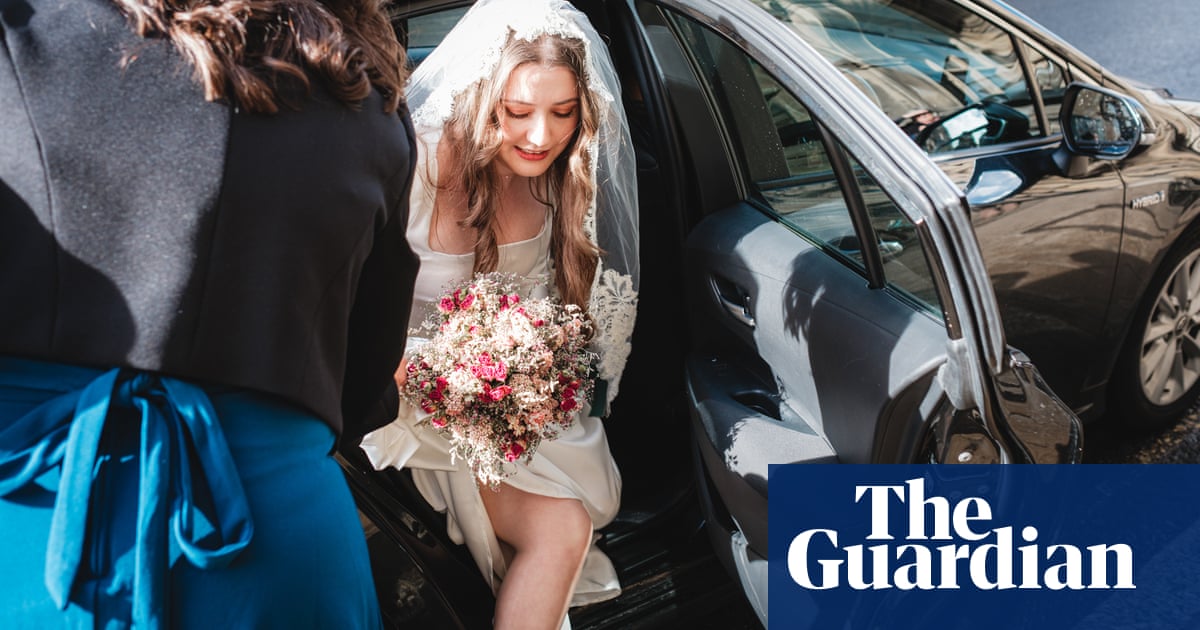
It’s January 2022 and my seven-year-old son is standing on his skateboard at the top of a concrete ramp that’s known in these parts as a “funbox”. Right now, it doesn’t seem so fun. I can feel the fear vibrating from him. I’m urging him to give it a go. Pleading, almost. The reason for my fervour? Only a few weeks earlier I’d stood, frozen, in that exact spot, before taking my own plunge. And I know how amazing he’ll feel afterwards. So, we take baby steps. First, we hold hands as he rolls down. Then we hold fingers. Then fingertips. Then, finally, he does it all on his own. As he makes it, the smile on his face lights up the entire skatepark.
There’s a strange alchemy to skateboarding: in a flash, terror turns into delight. My husband and I began skating three years ago, when we were 42 and 44 respectively, so that we could learn alongside our son. As a “later skater”, what I’ve come to realise is that everything seems impossible until you try it. Every minuscule achievement, every incremental progression, feels epic, and each experience hard-won. There’s a lesson in that. And apparently the establishment agrees: for the first time, skateboarding – for so long seen as a fringe pursuit, wild, rebellious, high in the misspent-youth pecking order – has been approved as a GCSE component in Wales and Northern Ireland.
Perhaps this is a natural evolution. Skateboarding entered the mainstream as part of the Tokyo 2020 Olympics, held in 2021, but the Covid pandemic that delayed those Games also played a role. Skateboarding experienced a boom in popularity during lockdown, which feels fitting for a sport that was first born on flat days; a replacement activity for surfers in the late 1940s to early 1950s, who turned to asphalt waves. I first tried skateboarding after a friend asked if I wanted to have a go on his board. At the time, I had no idea how much I’d gain from the not-so-simple art of standing sideways.
First, skateboarding teaches tenacity, because the only way to improve is to work at it; to move through those initial nerves and hold fast. Visit any skatepark and no matter how proficient the crowd, how gravity-defying the moves, you’ll see just as many tricks going wrong as right. Samuel Beckett could have been speaking for skaters when he wrote: “Try again. Fail again. Fail better.” Skaters know that not only is it OK to try something and not pull it off, it’s also unavoidable.
Perseverance has a huge part to play in growing self-confidence. I have a surfskate, which has a longer deck, bigger wheels and looser trucks. Initially, it gives the illusion of stability (erm, no). My first major fall was a couple of weeks in, before I’d learned any subtleties of balance. I was barely rolling along and the next thing I knew I was flat on my back, felled like an oak. Three years on, I’ve still got the scar on my elbow – and I was wearing pads. But this fall didn’t dissuade me: I’d already realised there was something about skateboarding that I loved beyond reason.
There are plenty of rational benefits too, not least mindfulness. When you’re skateboarding, it’s almost impossible to think of anything else. What magic, to step on a plank of wood with four little wheels and be transported to a place where your head is emptied and the outside world can’t touch you. With mental health problems at an all-time high, not least among teenagers, skateboarding has so much to give if people can be encouraged to give it a try. While there are some brilliant girl-focused initiatives – and an incredible icon in the world champion Sky Brown – from my experience, skateparks remain male-dominated spaces. If making it a GCSE subject means more girls signing up to skate, then that can only be a good thing.
The best part though? The community. My husband, son and I are part of an informal group of parents and children who skate together. On a dry weekend morning, you’ll find us down The Deaner. It’s our neighbourhood spot and we love it, from the tinkling music of the bottle caps beneath our wheels, to the way the sun makes the graffiti-covered buildings pop with colour. The place is luminous with memories and we’ve plenty more to make together. So, when I think about teenagers choosing skateboarding for their GCSEs, I immediately picture the readymade crew they’ll gain. The friends who’ll learn from one another. Facing down their fears, side by side; whooping the highs and sharing the falls. The value of that kind of camaraderie goes far beyond any graded achievement.
Z-Boys, Bones Brigade, My GCSE Class. Now, that’s got a nice ring to it.
Emylia Hall is the author of the The Shell House Detectives mystery series. Her latest book is The Rockpool Murder












